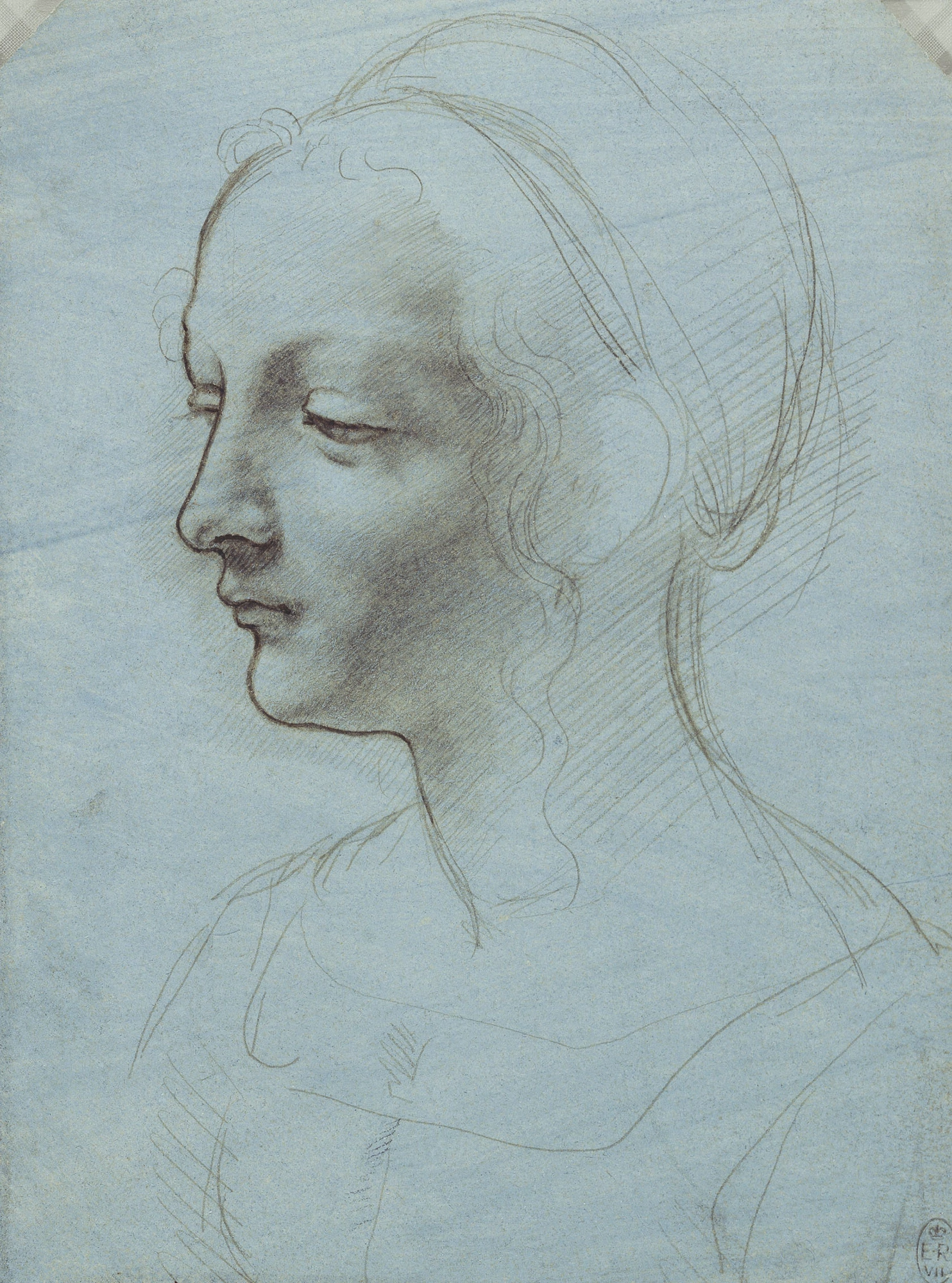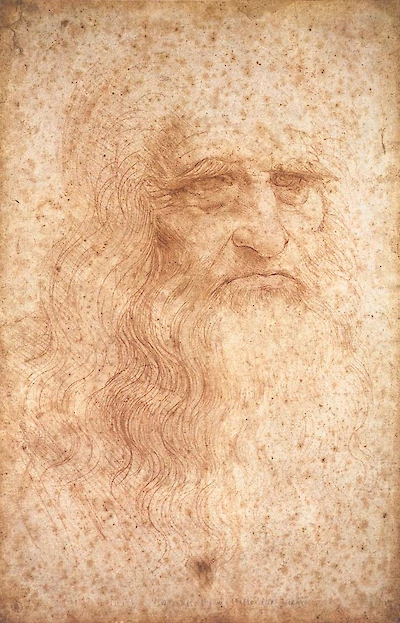

Leonardo da Vinci
Did you know he was a vegetarian?
1452 – 1519The eye, which is called the window of the soul, is the principal means by which the central sense can most completely and abundantly appreciate the infinite works of nature; and the ear is the second, which acquires dignity by hearing of the things the eye has seen. If you, historians, or poets, or mathematicians had not seen things with your eyes you could not report of them in writing. And if you, 0 poet, tell a story with your pen, the painter with his brush can tell it more easily, with simpler completeness and less tedious to be understood. And if you call painting dumb poetry, the painter may call poetry blind painting. Now which is the worse defect? to be blind or dumb? Though the poet is as free as the painter in the invention of his fictions they are not so satisfactory to men as paintings; for, though poetry is able to describe forms, actions and places in words, the painter deals with the actual similitude of the forms, in order to represent them. Now tell me which is the nearer to the actual man: the name of man or the image of the man. The name of man differs in different countries, but his form is never changed but by death.
And if the poet gratifies the sense by means of the ear, the painter does so by the eye, the worthier sense; but I will say no more of this but that, if a good painter represents the fury of a battle, and if a poet describes one, and they are both together put before the public, you will see where most of the spectators will stop, to which they will pay most attention, on which they will bestow most praise, and which will satisfy them best. Undoubtedly painting being by a long way the more intelligible and beautiful, will please most. Write up the name of God [Christ] in some spot and set up His image opposite and you will see which will be most reverenced. Painting comprehends in itself all the forms of nature, while you have nothing but words, which are not universal as form is, and if you have the effects of the representation, we have the representation of the effects. Take a poet who describes the beauty of a lady to her lover and a painter who represents her and you will see to which nature guides the enamored critic. Certainly the proof should be allowed to rest on the verdict of experience. You have ranked painting among the mechanical arts but, in truth, if painters were as apt at praising their own works in writing as you are, it would not lie under the stigma of so base a name. If you call it mechanical because it is, in the first place, manual, and that it is the hand which produces what is to be found in the imagination, you too writers, who set down manually with the pen what is devised in your mind. And if you say it is mechanical because it is done for money, who falls into this error, if error it can be called, more than you? If you lecture in the schools do you not go to whoever pays you most? Do you do any work without pay? Still, I do not say this as blaming such views, for every form of labour looks for its reward. And if a poet should say: “I will invent a fiction with a great purpose,” the painter can do the same, as Apelles painted Calumny. If you were to say that poetry is more eternal, I say the works of a coppersmith are more eternal still, for time preserves them longer than your works or ours; nevertheless they have not much imagination [29]. And a picture, if painted on copper with enamel colors may be yet more permanent. We, by our arts may be called the grandsons of God. If poetry deals with moral philosophy, painting deals with natural philosophy. Poetry describes the action of the mind, painting considers what the mind may effect by the motions [of the body]. If poetry can terrify people by hideous fictions, painting can do as much by depicting the same things in action. Supposing that a poet applies himself to represent beauty, ferocity, or a base, a foul or a monstrous thing, as against a painter, he may in his ways bring forth a variety of forms; but will the painter not satisfy more? are there not pictures to be seen, so like the actual things, that they deceive men and animals?
I myself, having exercised myself no less in sculpture than in painting and doing both one and the other in the same degree, it seems to me that I can, without invidiousness, pronounce an opinion as to which of the two is of the greatest merit and difficulty and perfection. In the first place sculpture requires a certain light, that is from above, a picture carries everywhere with it its own light and shade. Thus sculpture owes its importance to light and shade, and the sculptor is aided in this by the nature, of the relief which is inherent in it, while the painter whose art expresses the accidental aspects of nature, places his effects in the spots where nature must necessarily produce them. The sculptor cannot diversify his work by the various natural colors of objects; painting is not defective in any particular. The sculptor when he uses perspective cannot make it in any way appear true; that of the painter can appear like a hundred miles beyond the picture itself. Their works have no aerial perspective whatever, they cannot represent transparent bodies, they cannot represent luminous bodies, nor reflected lights, nor lustrous bodies, as mirrors and the like polished surfaces, nor mists, nor dark skies, nor an infinite number of things which need not be told for fear of tedium. As regards the power of resisting time, though they have this resistance, a picture painted on thick copper covered with white enamel on which it is painted with enamel colors and then put into the fire again and baked, far exceeds sculpture in permanence. It may be said that if a mistake is made it is not easy to remedy it; it is but a poor argument to try to prove that a work be the nobler because oversights are irremediable; I should rather say that it will be more difficult to improve the mind of the master who makes such mistakes than to repair the work he has spoilt.
We know very well that a really experienced and good painter will not make such mistakes; on the contrary, with sound rules he will remove so little at a time that he will bring his work to a good issue. Again the sculptor if working in clay or wax, can add or reduce, and when his model is finished it can easily be cast in bronze, and this is the last operation and is the most permanent form of sculpture. Inasmuch as that which is merely of marble is liable to ruin, but not bronze. Hence a painting done on copper which as I said of painting may be added to or altered, resembles sculpture in bronze, which, having first been made in wax could then be altered or added to; and if sculpture in bronze is durable, this work in copper and enamel is absolutely imperishable. Bronze is but dark and rough after all, but this latter is covered with various and lovely colors in infinite variety, as has been said above; or if you will have me only speak of painting on panel, I am content to pronounce between it and sculpture; saying that painting is the more beautiful and the more imaginative and the more copious, while sculpture is the more durable but it has nothing else. Sculpture shows with little labour what in painting appears a miraculous thing to do; to make what is impalpable appear palpable, flat objects appear in relief, distant objects seem close. In fact painting is adorned with infinite possibilities which sculpture cannot command.
Men and words are ready made, and you, O Painter, if you do not know how to make your figures move, are like an orator who knows not how to use his words.
As soon as the poet ceases to represent in words what exists in nature, he in fact ceases to resemble the painter; for if the poet, leaving such representation, proceeds to describe the flowery and flattering speech of the figure, which he wishes to make the speaker, he then is an orator and no longer a poet nor a painter. And if he speaks of the heavens he becomes an astrologer, and philosopher; and a theologian, if he discourses of nature or God. But, if he restricts himself to the description of objects, he would enter the lists against the painter, if with words he could satisfy the eye as the painter does.
Though you may be able to tell or write the exact description of forms, the painter can so depict them that they will appear alive, with the shadow and light which show the expression of a face; which you cannot accomplish with the pen though it can be achieved by the brush.